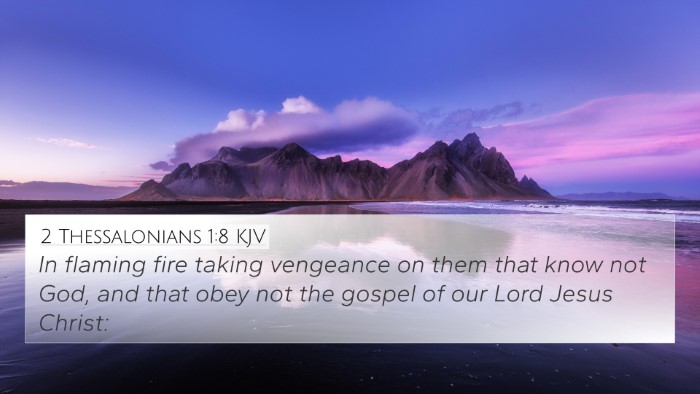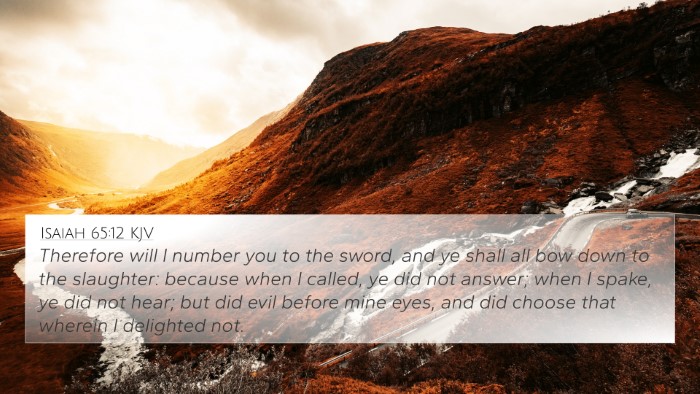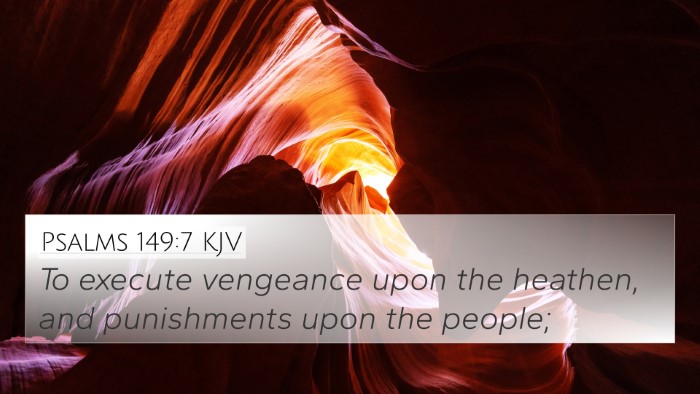Old Testament
Genesis Exodus Leviticus Numbers Deuteronomy Joshua Judges Ruth 1 Samuel 2 Samuel 1 Kings 2 Kings 1 Chronicles 2 Chronicles Ezra Nehemiah Esther Job Psalms Proverbs Ecclesiastes Song of Solomon Isaiah Jeremiah Lamentations Ezekiel Daniel Hosea Joel Amos Obadiah Jonah Micah Nahum Habakkuk Zephaniah Haggai Zechariah MalachiMicah 5:15 Similar Verses
Micah 5:15 Cross References
And I will execute vengeance in anger and fury upon the heathen, such as they have not heard.
Uncover the Rich Themes and Topics of This Bible Verse
Listed below are the Bible themes associated with Micah 5:15. We invite you to explore each theme to gain deeper insights into the Scriptures.
Micah 5:15 Cross Reference Verses
This section features a detailed cross-reference designed to enrich your understanding of the Scriptures. Below, you will find carefully selected verses that echo the themes and teachings related to Micah 5:15 KJV. Click on any image to explore detailed analyses of related Bible verses and uncover deeper theological insights.

Micah 5:8 (KJV) »
And the remnant of Jacob shall be among the Gentiles in the midst of many people as a lion among the beasts of the forest, as a young lion among the flocks of sheep: who, if he go through, both treadeth down, and teareth in pieces, and none can deliver.

2 Thessalonians 1:8 (KJV) »
In flaming fire taking vengeance on them that know not God, and that obey not the gospel of our Lord Jesus Christ:

Isaiah 65:12 (KJV) »
Therefore will I number you to the sword, and ye shall all bow down to the slaughter: because when I called, ye did not answer; when I spake, ye did not hear; but did evil before mine eyes, and did choose that wherein I delighted not.
Micah 5:15 Verse Analysis and Similar Verses
Understanding Micah 5:15
Micah 5:15 states: "And I will execute vengeance in anger and fury upon the heathen, such as they have not heard." This verse highlights the themes of divine justice and the imminent judgment of God upon nations that have turned away from His ways.
Verse Interpretation
In this scripture, Micah conveys a powerful message about God's righteous anger towards nations that oppress His people and reject His truth. This punishment reflects the broader biblical context of God's role as both a judge and a protector of His people.
Insights from Commentaries
This verse can be examined through the insights derived from notable public domain commentaries:
- Matthew Henry: Henry emphasizes God's sovereignty in executing His judgment. He suggests that this vengeance is not unwarranted but is a response to the unrepentant status of the heathen nations who have disregarded God's decrees.
- Albert Barnes: Barnes views this verse as a solemn declaration of God's determination to hold nations accountably. He notes that the "fury" mentioned signifies the depth of God’s displeasure against those who have acted contrary to His will.
- Adam Clarke: Clarke interprets this passage as a warning of impending judgment, portraying God as a fierce warrior against those who have oppressed His people. He underlines the idea that these judgments are more than mere acts of retribution; they are also intended to restore justice.
Cross-References and Connections
This verse can be linked to several other passages within the Bible that echo similar themes of divine judgment and justice. The following are notable cross-references:
- Isaiah 61:2: "To proclaim the acceptable year of the Lord, and the day of vengeance of our God; to comfort all that mourn." This verse speaks of God's intention to bring both comfort and judgment.
- Jeremiah 51:6: "Flee out of the midst of Babylon, and deliver every man his soul: be not cut off in her iniquity; for this is the time of the Lord's vengeance; He will render unto her a recompense." A proclamation regarding God's impending judgment on Babylon.
- Romans 12:19: "Dearly beloved, avenge not yourselves, but rather give place unto wrath: for it is written, Vengeance is mine; I will repay, saith the Lord." This verse connects to the theme of God's ultimate authority to execute vengeance.
- Revelation 19:15: "And out of His mouth goes a sharp sword, that with it He should smite the nations: and He shall rule them with a rod of iron." This supports the notion of divine judgment executed with power and authority.
- Psalm 94:1: "O Lord God, to whom vengeance belongeth; O God, to whom vengeance belongeth, show thyself." A plea for God's justice, echoing a similar sentiment found in Micah 5:15.
- Zechariah 1:15: "And I am very sore displeased with the heathen that are at ease: for I was but a little displeased, and they helped forward the affliction." This verse reinforces God's anger towards nations that oppress His chosen ones.
- 2 Thessalonians 1:6: "Seeing it is a righteous thing with God to recompense tribulation to them that trouble you." The apostle Paul confirms the New Testament’s witness to God's just retribution.
Thematic Connections
The connections between these verses illustrate a framework of God's justice throughout both the Old and New Testaments. Understanding Micah 5:15 within these themes can enhance our grasp of biblical justice, divine wrath, and ultimately, reconciliation.
Using Cross-References Effectively
For those studying Scripture deeply, utilizing a bible concordance or a bible cross-reference guide can aid significantly in identifying these connections between verses. Here are some methods for effective cross-referencing:
- Identify Themes: Look for recurring themes, such as judgment, vengeance, and mercy, to create a clearer understanding of Scripture.
- Comparative Bible Verse Analysis: Compare passages side by side to observe similarities and differences in context and message.
- Contextual Study: Delve into both the immediate and broader contexts to glean a deeper insight into the meanings and implications of each verse.
Conclusion
Micah 5:15 serves as a profound reminder of God’s relentless pursuit of justice and the eventual reckoning for nations and individuals who oppose His divine order. It encourages believers to trust in God's timing and His ultimate control over all things.
Further Study Resources
To enhance your understanding of Biblical texts and their interrelation, consider exploring:
- Bible cross-reference system: Familiarize yourself with tools that standardize cross-referencing.
- Comprehensive Bible cross-reference materials: Invest in resources that provide extensive connections and explanations.
Through careful study and exploration of scripture, believers can uncover the rich tapestry of God's word, leading to deeper faith and understanding.



